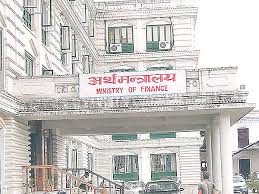Practicable budget for ensuring relief, propping up economy (Commentary)
 Narayan Prasad Ghimire / Kathmandu: A large number of people are facing mounting sufferings with the approach of monsoon, as they are yet to reconstruct their houses demolished by the devastating earthquakes last year. Industrialists are yet to regain business pace, for they suffered worst with the economic blockade preceded by the earthquake. Similarly, the price hike of daily goods is so exorbitant that the daily livelihood of a commoner has not only become difficult but quite painful. Investors are always crying for favourable atmosphere with political stability. After one and half years, the country has to hold multiple elections as per the provisions of the new constitution.
Narayan Prasad Ghimire / Kathmandu: A large number of people are facing mounting sufferings with the approach of monsoon, as they are yet to reconstruct their houses demolished by the devastating earthquakes last year. Industrialists are yet to regain business pace, for they suffered worst with the economic blockade preceded by the earthquake. Similarly, the price hike of daily goods is so exorbitant that the daily livelihood of a commoner has not only become difficult but quite painful. Investors are always crying for favourable atmosphere with political stability. After one and half years, the country has to hold multiple elections as per the provisions of the new constitution.
Amid this backdrop, the government is bringing the annual budget tomorrow. Facing diverse expectations is normal at such background. The circumstances this time however are different. To this, the Prime Minister has shared ambitious dreams. Whether these dreams as of excavation of petroleum products, and power from wind are incorporated in the budget is a key wonder among all, while how the strategic plans and measures the government adopts to materialize the dreams are equally important.
Of course, the budget addresses the issues from the daily livelihoods to the mega projects and national goals. Whether the allocation of budget conforms to the national goals, harmonizes with the ongoing plan, meets the commitments on economic justice and advancement of the country or the budget allocation is mere populist and distributive with short-term benefits is therefore observed carefully.
While talking of the popular programmes as augmentation of social security funds as allowance to the elderly citizens, the communist governments are considered liberal. Similarly, rise of salary to the government officials is to elate the bureaucracy. It is sure that generous address to these fronts not only earns quick popularity but also renders party’s political strategy. It is, however, dubbed by many as populist agenda of the communist governments. The budget is awaited to see how this government defends this blame.
In this connection, former Finance Minister Dr Ram Sharan Mahat cautioned government to refrain from the temptation of bringing an expansionary budget as it would also undermine the fiscal discipline. In a view given to a daily, he also suggested the government to bring budget as per its absorptive capacity. “If the government brings expansionary budget of Rs 1,000 billion, as has been rumoured, it would be difficult to spend as the government machinery has lost its appetite for expenditure,” he underscored.
Similarly, another former finance minister Surendra Pandey argues populist programmes would lead the country nowhere.
The suggestions to the government on the budgets also came from the US Ambassador to Nepal, Alaina B Teplitz. In a write-up in a national daily on Thursday, she suggests Nepal for political stability, easy tax policy, reliable resources, electricity supply, simple and transparent process to register foreign company to increase foreign investment. Nepal government should be ready to take significant measures to make Nepal an attractive destination for foreign investment, she added.
Moreover, some points unavoidable in this regard is blame game between the bureaucracy and political parties. It is not unusual that government officials especially involved in the budget making process blatantly accuse the political parties and leaders of hijacking budget and obstructing development projects, while the politicos too accuse the bureaucracy of showing obduracy in allocating sufficient budget as if the State coffer is their parental property. It is not however a new trend- it is a continuous traditional accusation which ultimately put the development needy people and places at the receiving end.
With this, the truth we can’t avoid is- the political interference especially with the mobilization of hacks and cadres in every development project is so noticeable that even the mega projects are obstructed merely on party bickering. On the other hand, red tapism and authoritative attitude in Nepal’s bureaucracy is still so entrenched that even the people’s representatives are regarded only as the spectators while framing this national economic and political document. Bureaucracy is blind that it does not take the budget as a political document. It obviously bypasses the participation of citizens in the budget making process. At such condition how can the people take the ownership of the development activities?
What measures can be kept intact to graduate the country to the status of a developing country from the least developed country by 2020. And, how does the government create the opportunities within the country to stop the exodus of youths toward Malaysia and Gulf countries? RSS
